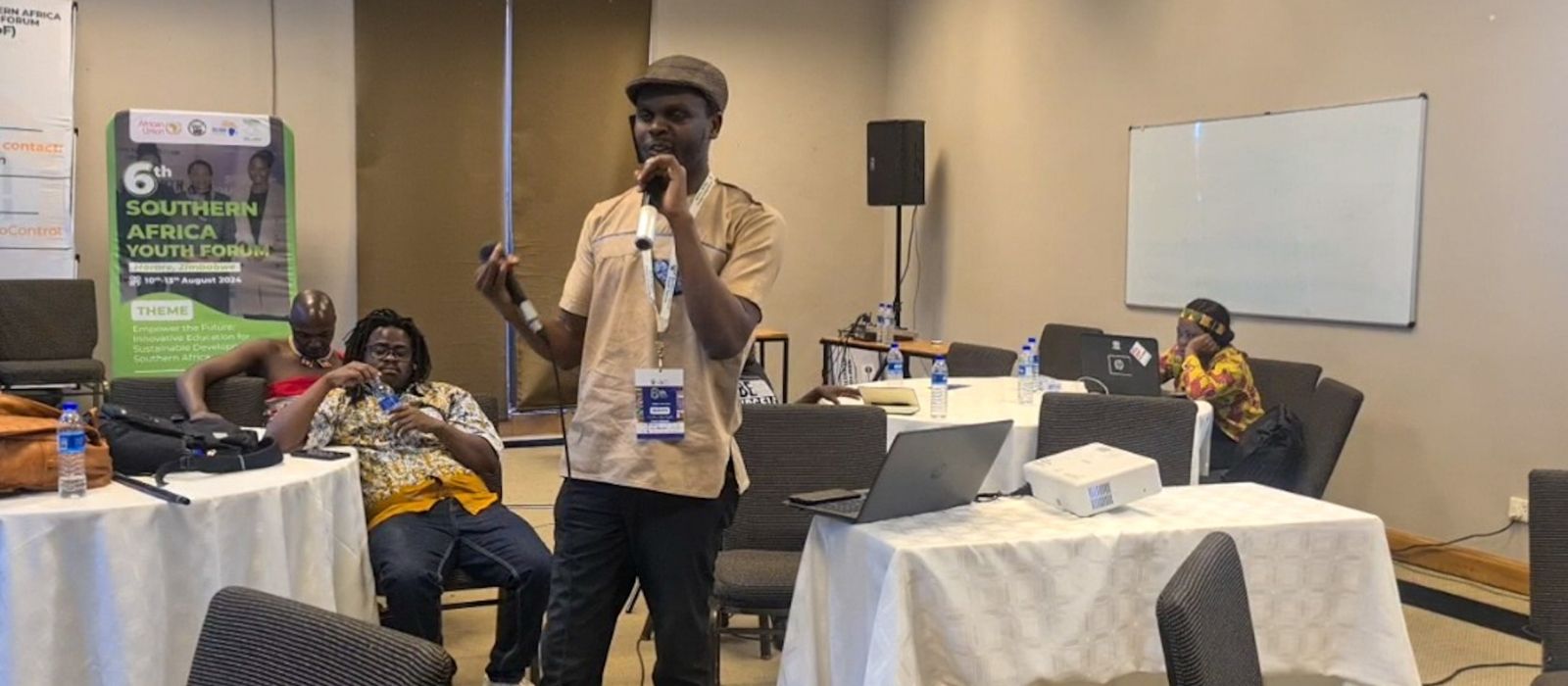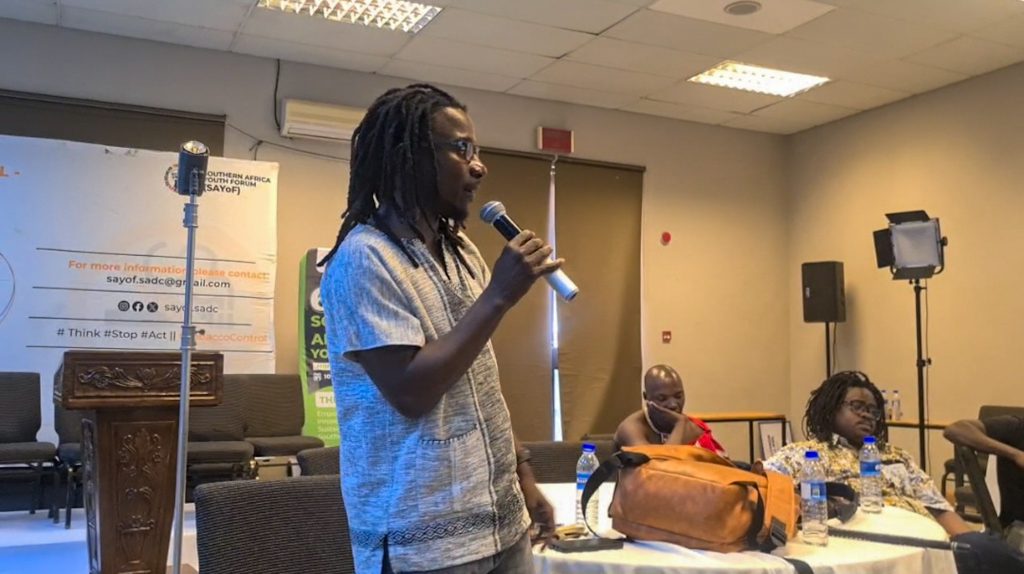
Youth Tax For Justice Network (YTJN) with support from the Africa Europe Foundation hosted a side session at the 6th Southern Africa Youth Forum on the sidelines of the 44th Ordinary Summit of the Heads of State and Government of the Southern African Development Community (SADC) in Harare, Zimbabwe. The side session was held on August 13, 2024, at the Celebration Center in Harare, Zimbabwe. The event was premised on the theme of “Pan-African Youth Perspectives on the Right to Education and Illicit Financial Flows“.
The session served as an empowering space for the youth to have their voices heard and to collectively call for greater youth engagement in tax justice and education advocacy initiatives. The session further amplified pan-African youth perspectives and mobilized young people to act in addressing these pressing challenges within their communities.
The recommendations made by the youth during this convening will be shared with the 6 SADC Countries starting with the Chair and Vice Chair of SADC, SADC Secretariat, SADC Parliamentary Forum, the African Union, United Nations agencies, the Private Sector, Media, Stakeholders, and Youth among others for action.
YTJN is a non-profit Pan-African youth organization that strives to have youth participation and engagement in influencing the Financing for development agenda in Africa.
In an exclusive interview with Jon Kafuko, the Programs Manager for YTJN, he shared his thoughts on the side session and how to keep the conversation going, providing a platform for young people across Africa to come together and amplify their perspectives on the right to education and the scourge of illicit financial flows.
SM: What inspired the Youth For Tax Justice Network to organize this event, and what were the key objectives?
JK: The key objectives of the session were to enlighten the youth about the negative impacts of illicit financial flows on the attainment of equitable quality education for all, to inform the youth about what can be done to curb illicit financial flows from Africa, and to show the youth how they can participate in the fight against illicit financial flows and the attainment of quality education for all.
We were inspired by the African Union theme of this year “Educate an African fit for the 21st Century: Building resilient education systems for increased access to inclusive, lifelong, quality, and relevant learning in Africa” which has its roots in Sustainable Development Goal No. 4 which calls upon United Nations member states to “Ensure inclusive and equitable quality education and promote lifelong learning opportunities for all”.
We were further inspired by the “Transforming Education Financing in Africa: A Strategic Agenda for the African Union Year of Education” report which revealed that Africa loses US$29 billion in education finance due to excessively low tax rates and aggressive tax avoidance by the wealthiest companies and individuals. The report further found that sealing loopholes used for tax abuse, and ensuring fair, gender-responsive, taxation can raise an additional US$146 billion in Africa every year. We found that an allocation of 20% (US$29.2 billion) of these additional funds to the education sector would be sufficient to cover costs for 25 million primary school children.
SM: How do you think the right to education is impacted by illicit financial flows in Southern Africa?
JK: According to the Transforming Education Financing in Africa report, a staggering 18.8m girls are out of primary school in Africa. The report further states that each year, Africa loses US$29 billion in education finance due to excessively low tax rates and aggressive tax avoidance by the wealthiest companies and individuals. This amount is enough to put all 18.8 million girls back in school.
Additionally, the report shows that 28 of the 52 African Union countries studied are spending over 12% of their national budgets on debt repayment. 15 of these countries are already spending more on debt servicing than education.
Under the burden of the debt crisis, the International Monetary Fund has advised 96% of these countries to cut or freeze spending on public sector workers leading to cuts in salaries, and restrictions in hiring new staff, including teachers.
This is likely to limit the countries’ budget allocations for education with dire consequences for learners and teachers.
SM: What are some potential solutions or actions that can be taken to address these challenges?
JK: SADC Partner states ought to domesticate Article 67 of the SADC Model Law on Public Financial Management which requires partner states to SADC to make public an assessment of the current nature of illicit financial flows, an assessment of progress in preventing illicit financial flows and the proposals for action to be taken to prevent illicit financial flows in their countries into their national laws.
Partner states to SADC ought to enhance their domestic resource mobilization efforts through fair taxation and supporting the enactment of a United Nations Tax Convention (which is expected to create a more inclusive global tax system that fully accommodates the interests of developing countries and curbs illicit financial flows) to have sufficient resources to allocate at least 20% of their national budgets to education financing. This will also reduce the reliance of partner states on foreign debt.
SADC Partner States ought to closely work with their counterparts in the European Union to fulfill commitments 2 & 3 which they made at the 6th EU – AU Summit in February 2022. Commitment 2 urges the two blocs to facilitate economic recovery through the Common Framework for Debt Treatments, reallocation of SDRs, and increased spending through international programs while commitment 3 urges the two blocs to combat Illicit Financial Flows, address domestic tax base erosion and profit sharing and cooperate on tax transparency.
SM: How can young people get involved and make a difference in the fight for tax justice and education?
JK: Young people ought to actively and meaningfully participate in the local and national budget cycles of their countries to ensure that at least 20% of the countries’ revenues are allocated to the education sector and to also ensure that the little resources allocated to the education sector are utilized for the intended purpose to promote transparency and accountability in public expenditure.
Young people also ought to apply pressure on their leaders to domesticate Article 67 of the SADC Model Law on Public Financial Management which requires partner states to SADC to make public an assessment of the current nature of illicit financial flows, an assessment of progress in preventing illicit financial flows and the proposals for action to be taken to prevent illicit financial flows in their countries.



